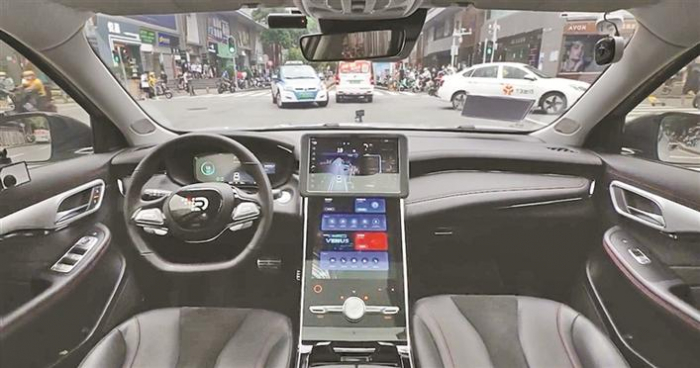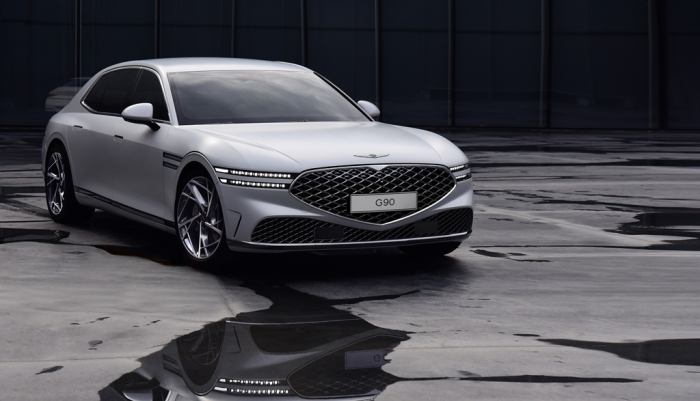Future mobility
Korea to further lag China on self-driving cars
South Korea will fall behind in accumulating crucial self-driving data for measures against accidents and other unforeseen events
By Aug 03, 2022 (Gmt+09:00)
3
Min read
Most Read
LG Chem to sell water filter business to Glenwood PE for $692 million


KT&G eyes overseas M&A after rejecting activist fund's offer


Kyobo Life poised to buy Japan’s SBI Group-owned savings bank


StockX in merger talks with Naver’s online reseller Kream


Meritz backs half of ex-manager’s $210 mn hedge fund



South Korea is expected to lag behind China further on autonomous vehicle technology as Shenzhen, the technology hub in Guangdong province, allowed autonomous cars to drive under limited conditions in certain areas from Monday.
Shenzhen permitted registered autonomous vehicles to operate without a driver in the driving seat in certain areas although a driver is required to be present in the vehicle, Level 4 self-driving technology, in a move to intensify competition in the future mobility technology in the world’s largest automobile market.
Levels of vehicle autonomy range from Level 0 – no driving automation – to Level 5 – full driving automation.
South Korea is at an early stage of Level 3 that allows drivers to take their hands off the steering wheel and eyes off the road in certain situations although drivers still need to be ready to take back control at any time.
Hyundai Motor Co., the country’s top automaker, aims to roll out mass-produced Level 3 self-driving cars, starting with the flagship luxury Genesis G90 sedan around the end of this year. Its affiliate Kia Corp. plans to launch the EV9, a pure-electric seven-seat sport utility vehicle, with self-driving technology that can travel at up to 80 kilometers per hour on highways next year.
South Korea is improving laws and regulations, targeting the commercialization of Level 4 vehicles in 2027. The government currently allows only temporary operation of self-driving cars of the level.
But the country is still far from the target as it needs to establish systems for accident records and analysis, ease obligation on autonomous vehicle drivers’ attention, set up requirements for pre-education on self-driving functions and regulations on cybersecurity for autonomous driving communication, experts said.
NOT ONLY CHINA BUT ALSO US, GERMANY
Other automobile powerhouses already paved the way for Level 4 vehicles. The US in March allowed companies to build and deploy autonomous vehicles without manual controls as long as they meet other safety regulations. Germany last year established a new law on self-driving to commercialize Level 4 vehicles.
Given such progressive policies, South Korea is likely to fall behind those countries on driving data accumulation, which is crucial to prepare measures against unexpected situations and accidents for stable autonomous driving. It will be possible to commercialize robotaxis only when the accident rate falls below 2%, industry sources said.

South Korea’s cumulative mileage of self-driving totaled only 720,000 km as of January, according to the Korea Automotive driving Development Innovation Foundation. That would be far lower than Chinese tech giant Baidu Inc.’s accumulated mileage of 21 million km.
SHENZHEN, BATTLEFIELD OF SELF-DRIVING TECHNOLOGY
Autonomous vehicle companies such as Baidu’s Apollo unit, Toyota Motor Corp.’s Pony, Nissan’s Weride and Alibaba’s AutoX are rushing to develop their technology in Shenzhen.
The city of 18 million populations introduced China’s clearest regulations on self-driving vehicles including a framework for liability in the event of an accident.
If a self-driving car has a driver behind the wheel, the driver will be responsible for an accident. If the car is driverless completely, the owner of the vehicle will be liable. If a defect causes an accident, the car owner will be able to seek compensation from the automaker.
Write to Hyung-Kyu Kim at khk@hankyung.com
Jongwoo Cheon edited this article.
More to Read
-
 Future mobilityHyundai Motor to buy Korean self-driving startup 42dot
Future mobilityHyundai Motor to buy Korean self-driving startup 42dotJul 29, 2022 (Gmt+09:00)
2 Min read -
 Future mobilityHyundai to run IONIQ 5 self-driving robotaxi pilot service in H1, 2022
Future mobilityHyundai to run IONIQ 5 self-driving robotaxi pilot service in H1, 2022Nov 25, 2021 (Gmt+09:00)
3 Min read -
 Future MobilityHyundai to launch Level 3 self-driving Genesis G90 in H2
Future MobilityHyundai to launch Level 3 self-driving Genesis G90 in H2Jan 02, 2022 (Gmt+09:00)
4 Min read
Comment 0
LOG IN


